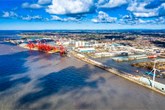Belships announces fleet expansion
Published by Oliver Kleinschmidt,
Deputy Editor
Dry Bulk,
Belships ASA has expanded its newbuilding programme with two new 64 000 DWT ultramax bulk carriers which will be delivered in 2028.
The vessels are leased on similar terms as previously announced transactions, and Belships is not required to make any down payments for these vessels. The agreements are conditional upon certain steps to be completed by the parties involved.
Belships now has a total of 10 newbuildings under construction at Japanese shipyards with delivery between 2024 and 2028. All vessels are leased on time charter for a period of 7 to 10 years from delivery, with purchase options around current market levels. There is no obligation to purchase any of the vessels. Cash breakeven for the vessels upon delivery is about US$14 250 per day on average. Belships is not using any equity, therefore this newbuilding program will not have any impact on cash and dividend capacity during the construction period.
Belships will be taking over new vessels whilst the orderbook and supply side in the dry bulk market approaches the lowest levels in decades. New Japanese-design ultramax bulk carriers represent the highest quality and lowest fuel consumption available in the market.
“These newbuildings represent growth prospects for the company packaged with financing which solves the predicament of very long lead times for new ships without jeopardising return on capital in the meantime. The acquisitions will also contribute to retaining a low and competitive cash break-even in the future as the fixed-cost structure for the newbuildings will blend with existing vessels with lower leverage or free of debt,” said Lars Christian Skarsgård, CEO of Belships ASA.
Click here for free registration to Dry Bulk
Read the article online at: https://www.drybulkmagazine.com/shipping/23042024/belships-announces-fleet-expansion/
You might also like
Peel Ports Group transforms bulk cargo operations with new £4m partnership
Peel Ports Group has partnered with digitalisation specialist TBA to transform its dry bulks standardisation programme and future-proof operations as part of a £4m investment.

